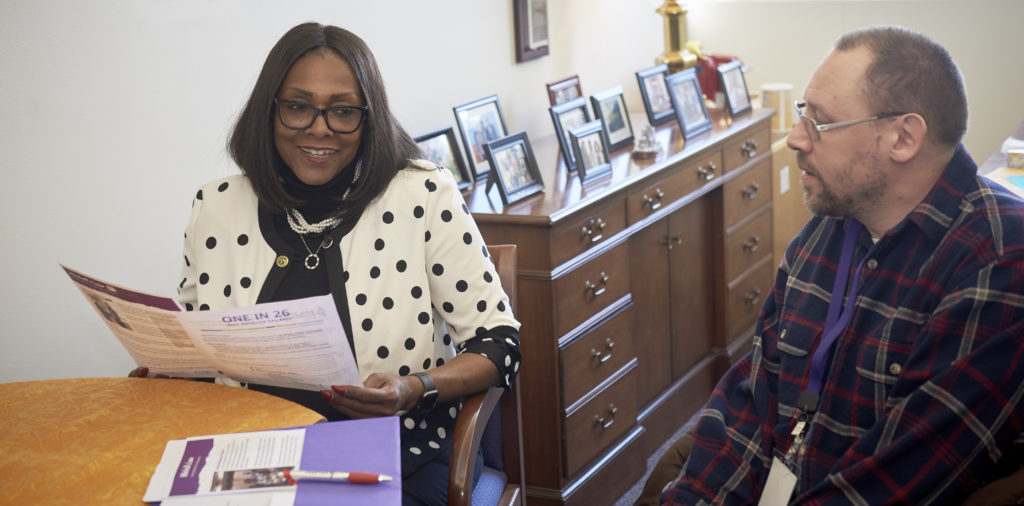The Minnesota epilepsy community had a strong and active advocate base this legislative session. The Epilepsy Foundation of Minnesota (EFMN) appreciates all of the individuals and families who met with and called legislators, wrote letters and emails, attended Epilepsy Day at the Capitol, testified at hearings, attended rallies, and joined us in coalition work. Here are some highlights of what was accomplished during the 2019 session.
Mitchell’s Law
Named for advocate Mitchell Radziej, this law permits an individual to identify up to three emergency contacts when applying for or renewing a driver’s license or Minnesota identification card. The emergency contact information is stored electronically and can be accessed by authorized personnel responding to emergencies.
Mitchell’s law is an example of grassroots advocacy in action. Upon hearing the idea, Mitchell’s legislators sponsored the bill in coordination with the Minnesota Brain Injury Alliance. Throughout the session, Mitchell’s advocacy and presence at the Capitol was instrumental in keeping this legislation moving. The bill is included in the transportation budget bill that Governor Walz signed into law.
Chloe Barnes Rare Disease Advisory Council
This grassroots, bipartisan bill, passed unanimously in both chambers and was signed into law by Governor Walz and creates a rare disease advisory council at the University of Minnesota. The council will advise legislators and state agencies on research, diagnosis, treatment, and education related to rare diseases. While epilepsy is not a rare disease, several types of epilepsy are rare. Overall, rare epilepsies and other rare diseases affect an estimated 30 million Americans.
The council is named in memory of two-year-old Chloe Barnes, who passed away from metachromatic leukodystrophy in 2010. Chloe’s mother, Erica Barnes, led the multiyear effort to create a council. Erica is the Minnesota State Ambassador for the Minnesota Rare Action Network.
Step Therapy Expansion
A coalition effort led by the National MS Society, this bill is an expansion of the 2018 step therapy law, ensuring all Minnesotans are protected and have quick access to the medications they need. The expansion extends these protections to public programs such as Medical Assistance and MinnesotaCare, and is included in the health and human services budget bill that was signed into law.
For the majority of people living with epilepsy, medication is the most common and cost-effective treatment for controlling and/or reducing seizures. Equally important is having meaningful and timely access to physician-directed care. Those living with epilepsy who have their medications switched, or who experience a delay in accessing medication, are at a high risk for developing breakthrough seizures and related complications. This expansion moves the epilepsy community one step closer to a critical priority – open access to physician-directed care and treatments.

Seizure Smart Schools
Epilepsy advocate Ruth Schmitz worked with EFMN to secure the partnership of both her Senator and House Representative in championing Seizure Smart Schools legislation this session. Advocates Mary Baatz, Bobby Benson, Dom Colasanti, Audrey Colasanti, John Colasanti, Alison Lillegaard, Rachel Melbie, Beth Messerly, Sylvia Nelson, Geoffrey Rojas, Dr. Doug Smith, and Marci Tuggle also helped to secure bill authors. Dozens of other advocates – too many to name here – played an important role by meeting with their legislators at our annual Advocacy Day at the Capitol and talking about the importance of seizure first aid training. While the legislation did not pass this session, it was heard in a House Education Committee hearing. We look forward to working with advocates again in 2020 to get this passed and signed into law.
Health Care Access Fund
The Health Care Access Fund (HCAF) is vital to Minnesota’s health care safety-net and supports MinnesotaCare, Medical Assistance, quality improvement initiatives, and public health prevention strategies. The primary funding source, a health care provider tax, was set to expire at the end of 2019. Under a bipartisan agreement, the health care provider tax was preserved at a 1.8% rate. 1 in 5 Minnesotans get their health care through MinnesotaCare or Medicaid, many are people with epilepsy.
Paramedic Medicine
This bipartisan bill allows emergency personnel to legally administer complex medication to patients with rare diseases. It directs the Emergency Medical Services Regulatory Board to propose guidelines authorizing emergency responders to administer medications carried by the patient – ensuring that all EMS services have the same guidelines and services across the state. Major ambulance providers already have plans for personnel to administer complex medication, but rural providers have had concerns about liability issues.
Best Life Alliance
Over the last few years, EFMN has supported the Best Life Alliance’s efforts to stabilize Home and Community Based Services and address the severe workforce shortage. This session, a 4.7% Competitive Workforce Factor, and adjustments to the frequency of updates for the Disability Waiver Rate System, were both included in the health and human services budget bill.
Education
The final education bill contains a 2% increase in the general education per pupil funding formula for each of the next two years, and allocates $90.7 million in special education cross-subsidy aid.
